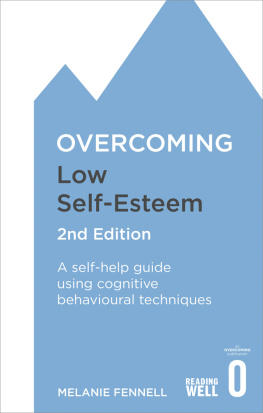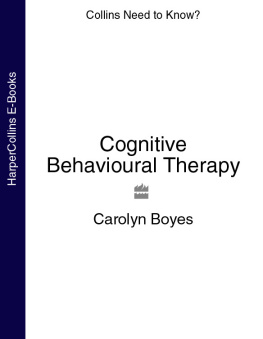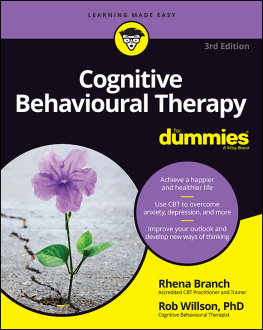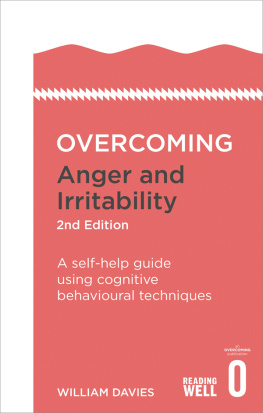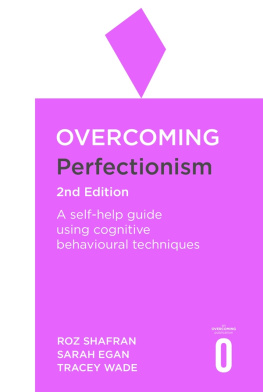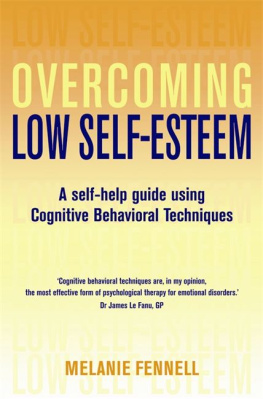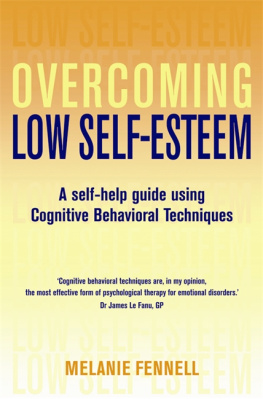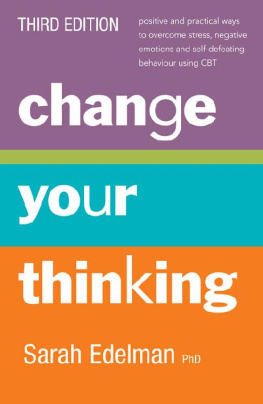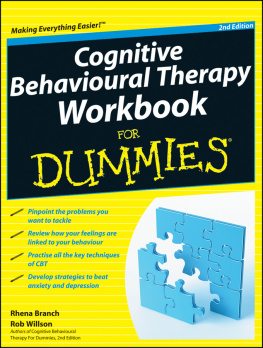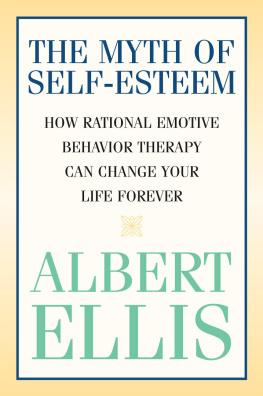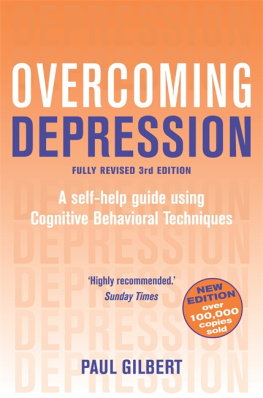Dr Melanie Fennell is the author of Overcoming Low Self-Esteem, the Overcoming Low Self-Esteem Self-Help Course, Boost Your Confidence and Talks With Your Therapist: Overcoming Low Self-Esteem (audio). She was a pioneer of cognitive behavioural therapy (CBT) in the UK, and is a Founding Fellow of the Oxford Cognitive Therapy Centre, an internationally recognised centre of excellence in CBT training, where she developed and led courses at Diploma and Masters level, as well as presenting many workshops and papers at major international conferences. As a member of research teams in the Oxford University Department of Psychiatry, Melanie has contributed to the development and evaluation of cognitive behavioural therapy for a range of emotional problems, especially depression. Her interest in low self-esteem grew out of this work. Overcoming Low Self-Esteem has become a classic of self-help literature, winning acclaim for its practical and user-friendly approach, and recommended by Reading Well, the UK National Health Services Books on Prescription self-help scheme. In July 2002, Melanie was voted Most Influential Female UK Cognitive Therapist by the membership of the British Association for Behavioural and Cognitive Psychotherapies, and in 2013 she was awarded an Honorary Fellowship by the Association.
The aim of the Overcoming series is to enable people with a range of common problems and disorders to take control of their own recovery programme.
Each title, with its specially tailored programme, is devised by a practising clinician using the latest techniques of cognitive behavioural therapy techniques which have been shown to be highly effective in changing the way patients think about themselves and their problems.
Many books in the Overcoming series are recommended by the UK Department of Health under the Books on Prescription scheme.
Other titles in the series include:
OVERCOMING ANGER AND IRRITABILITY, 2ND EDITION
OVERCOMING ANOREXIA NERVOSA
OVERCOMING ANXIETY, 2ND EDITION
OVERCOMING BODY IMAGE PROBLEMS INCLUDING BODY DYSMORPHIC DISORDER
OVERCOMING BULIMIA NERVOSA AND BINGE-EATING, 2ND EDITION
OVERCOMING CHILDHOOD TRAUMA
OVERCOMING CHRONIC FATIGUE
OVERCOMING CHRONIC PAIN
OVERCOMING COMPULSIVE GAMBLING
OVERCOMING DEPERSONALIZATION AND FEELINGS OF UNREALITY
OVERCOMING DEPRESSION, 3RD EDITION
OVERCOMING DISTRESSING VOICES
OVERCOMING GRIEF
OVERCOMING HEALTH ANXIETY
OVERCOMING HOARDING
OVERCOMING INSOMNIA AND SLEEP PROBLEMS
OVERCOMING MILD TRAUMATIC BRAIN INJURY AND POST-CONCUSSION SYMPTOMS
OVERCOMING MOOD SWINGS
OVERCOMING OBSESSIVE COMPULSIVE DISORDER
OVERCOMING PANIC AND AGORAPHOBIA
OVERCOMING PARANOID AND SUSPICIOUS THOUGHTS, 2ND EDITION
OVERCOMING PERFECTIONISM
OVERCOMING PROBLEM DRINKING
OVERCOMING RELATIONSHIP PROBLEMS
OVERCOMING SEXUAL PROBLEMS
OVERCOMING SOCIAL ANXIETY AND SHYNESS, 2ND EDITION
OVERCOMING STRESS
OVERCOMING TRAUMATIC STRESS
OVERCOMING WEIGHT PROBLEMS
OVERCOMING WORRY AND GENERALISED ANXIETY DISORDER, 2ND EDITION
OVERCOMING YOUR CHILDS FEARS AND WORRIES
OVERCOMING YOUR CHILDS SHYNESS AND SOCIAL ANXIETY
OVERCOMING YOUR SMOKING HABIT
OVERCOMING
LOW SELF-ESTEEM
2nd Edition
A self-help guide using
Cognitive Behavioural Techniques

MELANIE FENNELL

ROBINSON
First published in Great Britain in 2016 by Robinson
Copyright Melanie Fennell, 2016
The moral right of the author has been asserted.
All rights reserved.
No part of this publication may be reproduced, stored in a retrieval system, or transmitted, in any form, or by any means, without the prior permission in writing of the publisher, nor be otherwise circulated in any form of binding or cover other than that in which it is published and without a similar condition including this condition being imposed on the subsequent purchaser.
A CIP catalogue record for this book
is available from the British Library.
Important Note
This book is not intended as a substitute for medical advice or treatment. Any person with a condition requiring medical attention should consult a qualified medical practitioner or suitable therapist.
ISBN: 978-1-47211-930-8
Robinson
An imprint of
Little, Brown Book Group
Carmelite House
50 Victoria Embankment
London EC4Y 0DZ
An Hachette UK Company
www.hachette.co.uk
www.littlebrown.co.uk
Contents
PART ONE
WHAT IS LOW SELF-ESTEEM?
An introduction to this book
PART TWO
UNDERSTANDING LOW SELF-ESTEEM
PART THREE
OVERCOMING LOW SELF-ESTEEM
WHAT IS LOW
SELF-ESTEEM?
An introduction to this book
What do we mean by low self-esteem?
Self-image
Self-concept
Self-perception
Self-confidence
Self-efficacy
Self-acceptance
Self-respect
Self-worth
Self-esteem
All these words refer to aspects of the way we view ourselves, the thoughts we have about ourselves, and the value we place on ourselves as people. Each has a slightly different shade of meaning.
Self-image, self-concept and self-perception all refer to the overall picture a person has of him- or herself. These terms do not necessarily imply any judgement or evaluation, but simply describe a whole range of characteristics. For example:
National, and perhaps regional, identity (e.g. I am English, I come from New York)
Racial and cultural identity (e.g. I am black, I am Jewish)
Social and professional role (e.g. I am a mother, I am a policeman)
Life stage (e.g. I am just thirteen, I am a grand-parent)
Physical appearance (e.g. I am tall, I have brown eyes)
Likes and dislikes (e.g. I love football, I cant stand spinach)
Regular activities (e.g. I play baseball, I use a computer)
and
Psychological qualities (e.g. I have a sense of humour, I lose my temper easily)
Self-confidence and self-efficacy, on the other hand, refer to our sense that we can do things successfully, and perhaps to a particular standard. As one self-confident person put it, I can do things and I know I can do things. For example:
Specific competencies (e.g. I am good at maths, I can catch a ball)
Social relationships (e.g. When I meet new people, on the whole I get on well with them, I am a good listener)
General coping ability (e.g. If I set out to get something, I usually get it, I am a good person to turn to in a crisis)
Self-acceptance, self-respect, self-worth and self-esteem introduce a different element. They do not simply refer to qualities we assign to ourselves, whether good or bad. Nor do they simply reflect things we believe we can or cannot do. Rather, they reflect the overall opinion we have of ourselves and the value we place on ourselves as people, our fundamental sense of worth. The tone of this may be positive (e.g. I am good, I am worthwhile) or negative (e.g. I am bad, I am useless). When the tone is positive, this reflects broadly healthy self-esteem. But when the tone is negative, we are talking about low self-esteem.
Next page
